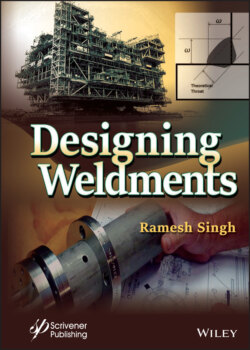Читать книгу Designing Weldments - Группа авторов - Страница 11
Оглавление
List of Tables
1 Table 2.1 Properties of materials.
2 Table 2.2 Modulus of elasticity of common engineering metals.
3 Table 3.1 Load components of design formulas and symbols used.
4 Table 3.2 Member components and symbols used in the formula.
5 Table 3.3 Member components (stress and strain) and symbols used in the formula.
6 Table 3.4 Shear modulus of elasticity (modulus of rigidity of some common materials).
7 Table 4.1 Type of weld joints.
8 Table 4.2 Flare groove weld sizing.
9 Table 4.3 Allowable stress and strength level for steel welds.
10 Table 4.4 Allowable unit load on steel fillet welds.
11 Table 4.5 Z loss table.
12 Table 4.6 Minimum weld size for PJP welds.
13 Table 4.7 Fillet weld (leg) size for skewed fillet -tee welds.
14 Table 4.8 Minimum fillet weld sizes.
15 Table 4.9 Stress on welds for different loading.
16 Table 4.10 CJP joints designed for T-K-Y tubular structures.
17 Table 4.11 Suggested allowable stress range in steel weldments.
18 Table 4.12 Aluminum alloy designation system.
19 Table 4.13 Cast aluminum designation and numbering system.
20 Table 4.14 Temper designation letters and meaning.
21 Table 4.14 Effect of service temperature on, as welded and heat treated and aged welds.
22 Table 5.1 Master chart of welding and joining processes.
23 Table 5.10.1 Fuel gas characteristics.
24 Table 5.12 Application of various welding and joining processes for different types of metal and materials.
25 Table 7.1 Mechanical properties of various metals.
26 Table 7.2 Mechanical properties of copper grades and alloys.
27 Table 7.3 Mechanical properties of aluminum and its alloys, with temper.
28 Table 7.4 Mechanical properties of various grades of Austenitic stainless steels.
29 Table 7.5 Comparison of mechanical properties of grades of steel.
30 Table 7.6 HSS rect property table.
31 Table 7.7 Metric to US standard unit conversion.
